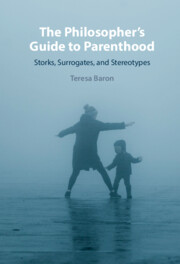Book contents
- The Philosopher’s Guide to Parenthood
- The Philosopher’s Guide to Parenthood
- Copyright page
- Dedication
- Contents
- Acknowledgements
- Introduction
- Chapter 1 Babies, Blueprints, and Blood Ties
- Chapter 2 Social Roles, Stereotypes, and Being ‘Seen’ as a Parent
- Chapter 3 ‘Do You Have a Licence for That?’ Legal Parenthood and Transfers of Children
- Chapter 4 Duties, Dilemmas, and (Re)distribution
- Chapter 5 Paradigms and Parental Projects
- Conclusion
- Bibliography
- Index
Chapter 5 - Paradigms and Parental Projects
The Intersection of Parenthood and Reproductive Ethics
Published online by Cambridge University Press: 15 January 2023
- The Philosopher’s Guide to Parenthood
- The Philosopher’s Guide to Parenthood
- Copyright page
- Dedication
- Contents
- Acknowledgements
- Introduction
- Chapter 1 Babies, Blueprints, and Blood Ties
- Chapter 2 Social Roles, Stereotypes, and Being ‘Seen’ as a Parent
- Chapter 3 ‘Do You Have a Licence for That?’ Legal Parenthood and Transfers of Children
- Chapter 4 Duties, Dilemmas, and (Re)distribution
- Chapter 5 Paradigms and Parental Projects
- Conclusion
- Bibliography
- Index
Summary
In the final chapter of the book, I argue that future research in philosophy of parenthood should take either a significantly broader or significantly narrower view of parenthood (or parental rights/obligations). We should not assume that we can use any of these four key concepts of parenthood independently, without taking into account their interrelations with others. We may therefore move forward either by considering problem cases in light of these concepts as an interrelated web (or ‘family’) or by stripping back the questions being asked to investigate more specific concepts. For example, the latter approach to moral parenthood might involve putting aside the widespread presupposition that parental rights and obligations are a concomitant ‘package’ and instead focusing on isolated issues, such as the right not to be separated from one’s biological offspring. The rights and obligations with which philosophers are chiefly concerned should, on this approach, be stripped away from the myth of ‘the parent’ as one straightforward entity with clear and consistent characteristics.
Keywords
Information
- Type
- Chapter
- Information
- The Philosopher's Guide to ParenthoodStorks, Surrogates, and Stereotypes, pp. 164 - 189Publisher: Cambridge University PressPrint publication year: 2023
